Abandoning the Church Has No Appeal for Traditionalists
Why making the pope the be-all and end-all of Catholicism is a sure road to catastrophe
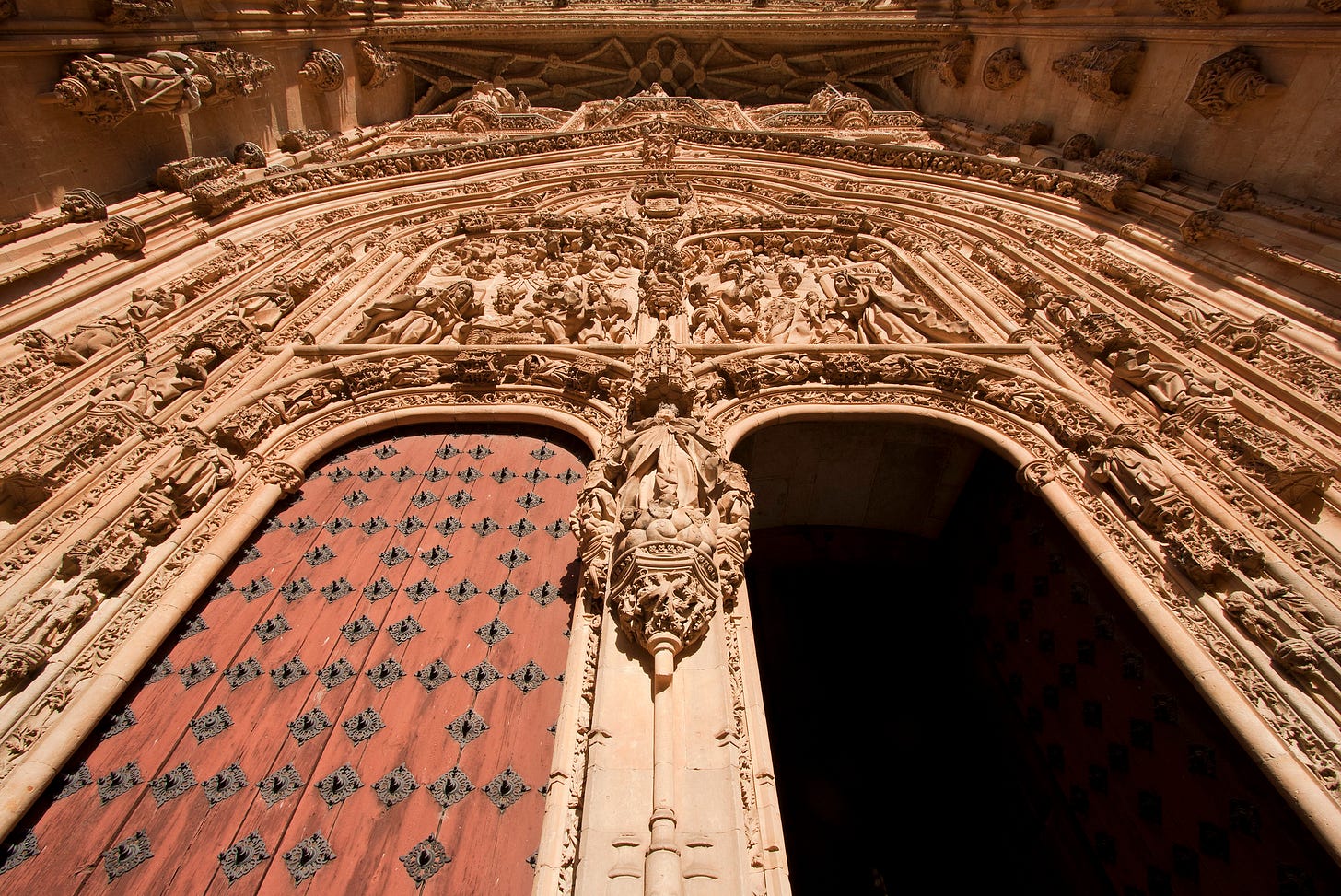
NOTE to Everyone: As of December 1, Tradition & Sanity will move permanently to Pelican+. After that point, this Substack will publish only brief excerpts, with the full versions over there. Between now and December 1, posts will be published at both places. In this transitional phase, I encourage you to check out Pelican+, a multi-author, multi-media traditional Catholic platform of which I am excited to be a co-founder. -PAK
NOTE to Paying Subscribers: New enterprises — especially anything reliant on technology — often experience unexpected delays. The promised email with information about how to transition over to T&S at Pelican+ will be going out quite soon. Thanks for your patience!
During the past dozen years (and running), one hears of Catholics losing or questioning their faith because they think: “If a pope can be so wrong, then the Catholic religion mustn’t be true.”
Surely we ought to be made of sterner stuff than that.
Why should the pope be seen as the “be-all and end-all” of Catholicism? As the one and only measure of what the Church believes and how we are to live and worship? This view should strike us as frankly bizarre. We are heirs to 2,000 years of ecclesiastical tradition. We have Scripture, which, in spite of its obscurities and subtleties, does teach important fundamentals very clearly. We have the sacred liturgy, the lex orandi, which from apostolic seeds grew organically into the great rites of East and West, bearing notable witness to the lex credendi. We have the writings and the witness of a host of saints, including Church Fathers, Doctors, and mystics (just think, for instance, of St. Catherine of Siena’s Dialogue!); we have hundreds of mutually consistent catechisms from before the conciliar meltdown. Nearly every pope we’ve ever had venerated these sources and drew his own teaching from them.
If, therefore, we’ve had several less-than-stellar popes who have refused to take their bearings from the sources and monuments to which Catholics have always looked, wouldn’t this mean that they are simply royally abusing their authority in all the areas in which popes can be imprudent and fallible? I do not see how this changes the Catholic religion — unless that religion is equated with a mindless adoption of every opinion, statement, whim, and pet peeve of a reigning pontiff.
I continue to be amazed that there are people who treat the distinction between fallible and infallible teaching as merely academic, when the one literally means “able to be erroneous” while the other means “unable to be erroneous.” Distinctions between levels of authority are in fact intuitive and have only ceased to be intuitive because we have mystified the magisterium.1
I’m aware that one can find over-the-top statements by some post-Vatican I popes (e.g., Pius X) that virtually amount to “L’Eglise c’est moi.” But since this position itself is not something authoritatively taught or binding on us, it belongs to the category of “official theology,” not settled Catholic doctrine, much less dogma — and official theology may certainly contain errors or omissions, as Thomas Pink explains so well.
The publication of my writings on hyperpapalism occasioned many disclosures of the extent to which certain people — especially those who are questioning the Faith or have already left the Church — have simply identified Catholicism with the mind of the regnant pope, as if the very substance of the Faith is not knowable in any way apart from what the current pope says it is. I continue to find this astonishing.
What if a pope in his “ordinary Magisterium” contradicted the Nicene Creed? Would we chuck out the Creed, or would we condemn the pope for contradicting it? What if he contradicted a clear teaching of Scripture, one on which there had always been unanimity? What if he rejected one of the Church’s venerable and immemorial liturgical rites, whether Latin or Greek? It seems to me that there should not be even a moment’s hesitation about what we ought to hold fast to. The moment you say that a pope is allowed to depart from the authoritative witness of tradition (in which is comprised everything that Holy Mother Church possesses, including Scripture) or that his mind and will overpower that witness to such an extent that it becomes totally malleable in his hands, you have already undermined the claim of Catholicism to be always and forever true. It’s done for.
The irony is this: the more you exalt and inflate the papacy, the more fragile you make the case for Catholicism, as the sort of pope the theory demands becomes more and more improbable or even simply impossible. This is why hyperpapalism snaps at a moment into sedevacantism.
The only way the Faith can be seen to be true, for those who are approaching it rationally, is if it is consistent and coherent across the ages. I am among those who are convinced by St. John Henry Newman (inter alia) that such consistency and coherence is present in the historical record and can be ascertained by men of good will. It is precisely this consistency and coherence that has too often been lacking in the non-infallible teaching and pastoral practice of recent popes.
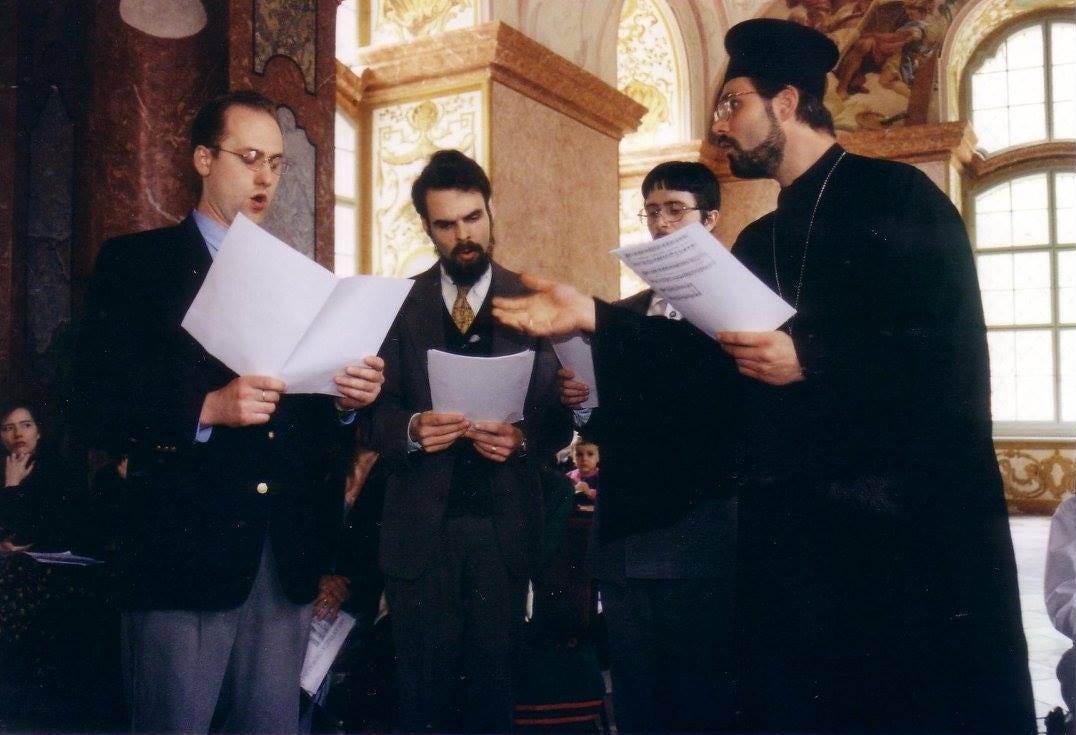
“Then why not become Orthodox?” some people ask.
I am Roman to the core. I love the traditional Roman Rite and the other orthodox rites of the West, and find myself much more at home in them (as much as I love and appreciate the Byzantine Divine Liturgy, which I have attended extensively and in many languages, and have even cantored many times).2
I am a disciple of St Thomas Aquinas, who beats the cassock off any post-patristic Orthodox theologian. And while I admire many Eastern saints — I try to practice “greatest common denominator” ecumenism: that’s why I have an icon in my home of St. Seraphim of Sarov, whose sanctity cannot be questioned, even if some of his opinions must be — nevertheless the Western saints of every century are my immediate brothers and sisters.
I am a musician who loves the heritage of Western sacred music from Gregorian chant to modern polyphony, including works for pipe organ from the past several centuries. In variety, magnificence, and subtlety, this heritage incalculably exceeds Eastern sacred music (especially if we put aside the Eastern repertoire of recent centuries that grew up thanks to the influence of Western composers living in the East!). As great as some Byzantine church buildings are, I am far more at home in the Romanesque and Gothic churches of the West. I give these various examples not to reduce the Faith to culture, but to speak about the whole “phenomenon” of the Roman Church. It is a totality of life, culture, literature, language, theology, worship, hagiography.
And then there’s the kicker: If I decided to go East, which one of the crowd of autocephalous patriarchs would I decide to put myself under? A flock of little popes who look fancy (complete with liturgical combs for mighty beards!) and who keep their glorious liturgies intact, but whose doctrine is not always very consistent or even intelligible!
The Roman Catholic Church is my spiritual, liturgical, ecclesial home.
Leaving the Church is not even on the remotest edge of my radar screen, let alone a near and present danger. And this is why I am determined to fight with every ounce of my strength against any hierarch, be he the pope himself, who threatens or assaults the Faith of the Church, as held and taught and lived in the West. He has no authority to do that. He is just the pope.
And if a pope were to say (as the last one did) that all that I love about the Latin Church is “rigid” and “nostalgic” and “out of date” and “closed off to surprises” and whatever other nonsense, I will know that he is in the devil’s pay, since no pope who was a believer in Christ and a practicing Catholic would ever speak thus, or could even think of speaking thus.
Let me offer a comparison.
We all know that the USA is deeply corrupt in its culture. Authentic Christianity here is under relentless attack by liberal Protestantism, cancer-phase capitalism, and woke ideology, to name only a few of its adversaries.
Now, let’s say there was a place in the world that was free of such evils; where life was, on the whole, better. A friend might say to me: “You’re always pointing out how corrupt your country is. Why don’t you just leave and move to Tradistan, and be done with it? You’d be a lot happier there.” What would my response be? “I don’t mind visiting Tradistan, and I admire it from a distance, but America is my land, my country, my people. It’s where I’m from and where I feel at home. It’s part of who I am deep down. I am devoted to this country with a Christian patriotism. I want to stay here and do what I can to help it. Becoming an expat, whatever appeal it may have, is not for me. Indeed, I believe I have a God-given obligation to hold my ground and to fight the enemies.”
Well, that is how it is with the Latin Church for me, and, I believe, for the vast majority of Latin traditionalists. We may be hated in our own home by those who have turned against the family heritage and name, but we have no intention of leaving it; and if someone unjustly throws us out of the rooms, we will camp in the backyard until we can get back in. We will fight, with guerrilla tactics, the barbarians who have been allowed to invade and wreak havoc. Under no circumstances would we walk away and simply surrender our home to their violence.
It seems to me that the entire discussion of hyperpapalism has been severely muddled by some of our Catholic apologists who were once Protestant or Eastern Orthodox and who feel threatened (maybe even tempted?) by discussions of the pope’s waywardness, his negligence, his errors. They are tempted to leave the Church. This, in turn, makes them dreadfully bad apologists because they vastly overemphasize the pope and the papacy’s role. They end up virtually equating Catholicism with the papacy.
This is an unhealthy exaggeration. The papacy is a key component of the Catholic Faith — but only one of many. The pope is an instrument in the hands of God; but so are the liturgy, the saints, devotions, catechisms, Church Fathers and Doctors, and the communities of believing Catholics of which we are a part, from the family to the parish to the diocese. The bishop, too, as I recall, has a role that is not reducible to a branch manager of Vatican, Inc. Let’s recall three passages from the ever-quotable St. Vincent of Lérins:
I have often then inquired earnestly and attentively of very many men eminent for sanctity and learning, how and by what sure and so to speak universal rule I may be able to distinguish the truth of Catholic faith from the falsehood of heretical pravity; and I have always, and in almost every instance, received an answer to this effect: That whether I or any one else should wish to detect the frauds and avoid the snares of heretics as they rise, and to continue sound and complete in the Catholic faith, we must, the Lord helping, fortify our own belief in two ways; first, by the authority of the Divine Law, and then, by the Tradition of the Catholic Church.
He is a genuine Catholic who continues steadfast and well-founded in the faith, who resolves that he will believe those things, and only those things, which he is sure the Catholic Church has held universally and from ancient times… It is therefore an indispensable obligation for all Catholics who are eager to prove that they are true sons of Holy Mother the Church to adhere to the holy faith of the Fathers, to preserve it, to die for it, and, on the other hand, to detest the profane novelties of profane men.
But whatsoever a teacher holds, other than all, or contrary to all, be he holy and learned, be he a Bishop, be he a Confessor, be he a Martyr, let that be regarded as a private fancy of his own, and be separated from the authority of common, public, general persuasion, lest, after the sacrilegious custom of heretics and schismatics, rejecting the ancient truth of the universal Creed, we follow, at the utmost peril of our eternal salvation, the newly devised error of one man.
St. Vincent’s argument, which it is fair to say is held in one form or another by all of the Fathers of the Church, is not incompatible with diverse local traditions of prayer or theological expression or ascetical-mystical practices, provided they do not essentially contradict one another. But it certainly excludes sheer novelty that contradicts what is already divinely given; it excludes change understood as evolutionary mutation.
In modern times, a reductionistic mentality is at work in all areas of life and thought; we should not be surprised to find it seeping into discussions of doctrine and liturgy. So little holism, so many mechanistic assumptions. The ability to see wholes and to take things as wholes seems rare, when it once would have been quite ordinary. Tradition is a whole that is greater than the sum of its parts; so is dogma; so is liturgy.
Our thinking about the papacy needs to come from an instinct that is deeper than the legal positivism, deeper than the utilitarian reductionism, deeper than the governmental voluntarism characteristic of the modern period. Just as we need to recognize that the sacraments cannot be reduced to their conditions for validity, with everything else relegated to the status of window-dressing, so too, in a similar way, the comparison of Roman Catholicism and Eastern Orthodoxy cannot be boiled down to a few binary intellectual stances:
“Since the two hold the same doctrines concerning sacraments, then if you believe X about the pope, you should be Roman Catholic, while if you believe Y about the pope, you should be Eastern Orthodox.” (A more subtle expositor might add that your belief of X or Y about the filioque, purgatory, the Immaculate Conception, etc., is also relevant.)
In reality, we’re talking about a choice between two flesh-and-blood traditions — including, of course, their doctrinal positions but encompassing much, much more. The realization of this immeasurable depth and all-encompassing breadth of tradition also has the advantage of being more respectful: you don’t have to spit on the Orthodox to say that you would never choose to join them.
Returning to our point of departure: If there’s something extremely unhealthy about hyperpapalism, would it not be entirely in keeping with the known ways of Divine Providence to orchestrate history in such a way as to wean Latin-rite Catholics off it, even if that meant a lot of pain and difficulty? Addictions of any kind are harmful, so we should want to get rid of them; yet it’s painful to be freed from the addictive substance. It felt good, after all, to cheer for the pope (“John Paul II, We Love You!”) and it was comfortingly easy to slap an equal sign between him and the Faith.
Looking at the ever-mounting postconciliar wreckage, we can say that not only theologians but even “Jane and Joe Catholic” are being asked to retool their simplistic picture of the papacy. Like so much we see in the pages of salvation history, God’s permission of certain evils and His raising up of an ecclesial response to them is a severe mercy that brings healing for a grave disorder. How can that be other than good and helpful for us in the short term and in the long term?
Now, more than ever, is a great and glorious time to be a Catholic of the Latin rite, holding our ground against the jailers of tradition.3
See Dr. John Joy’s Disputed Questions on Papal Infallibility for the best and most succinct treatment of this entire question.
As for the so-called “Western Orthodox,” their liturgy is already compromised by the artificial and anachronistic insertion of an epiklesis into the Roman Canon, a decision based either on now-exploded mid-20th-century liturgical scholarship or on a false theology of consecration.
This is a legitimate translation of the phrase “traditionis custodes.”



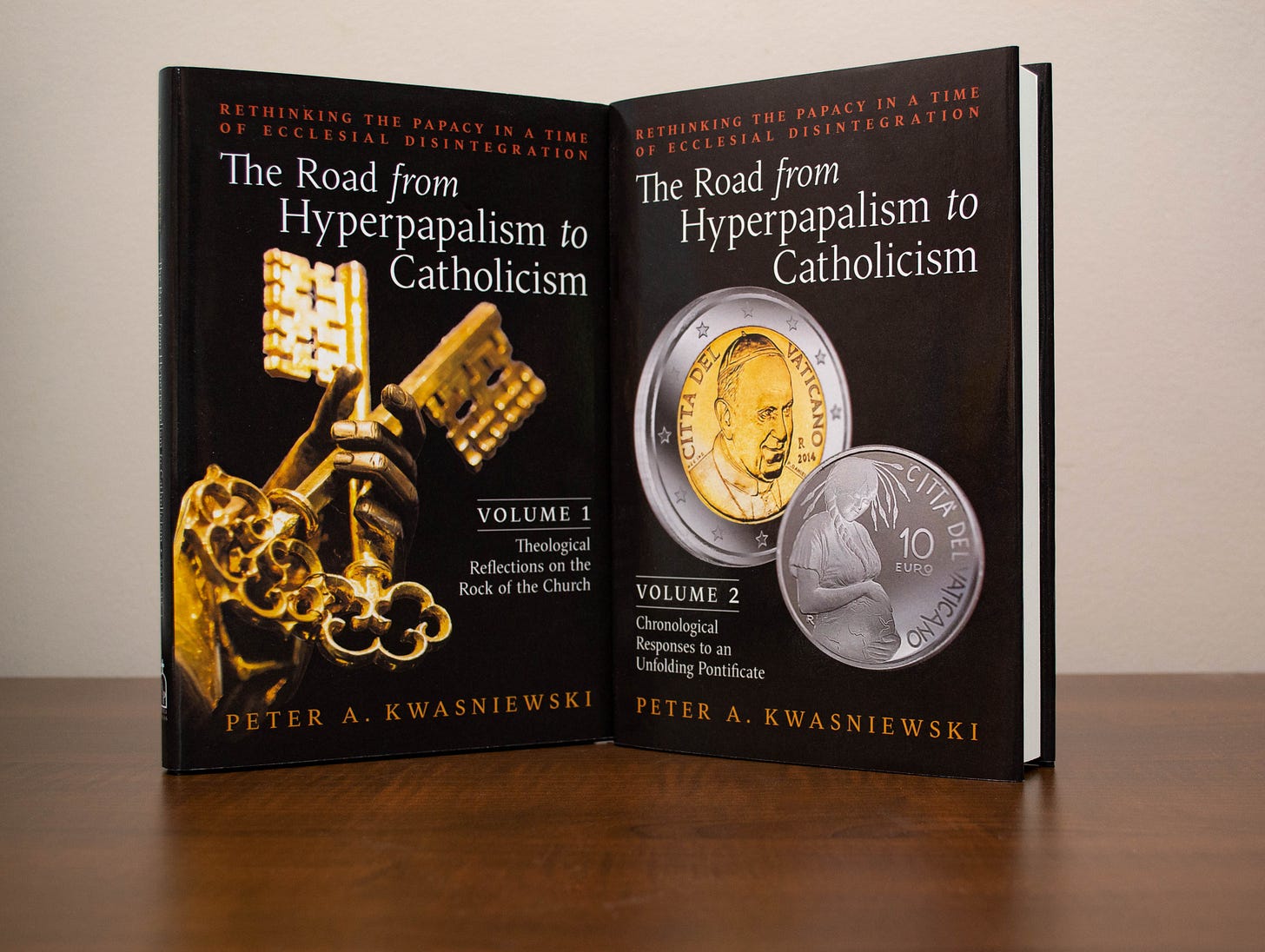
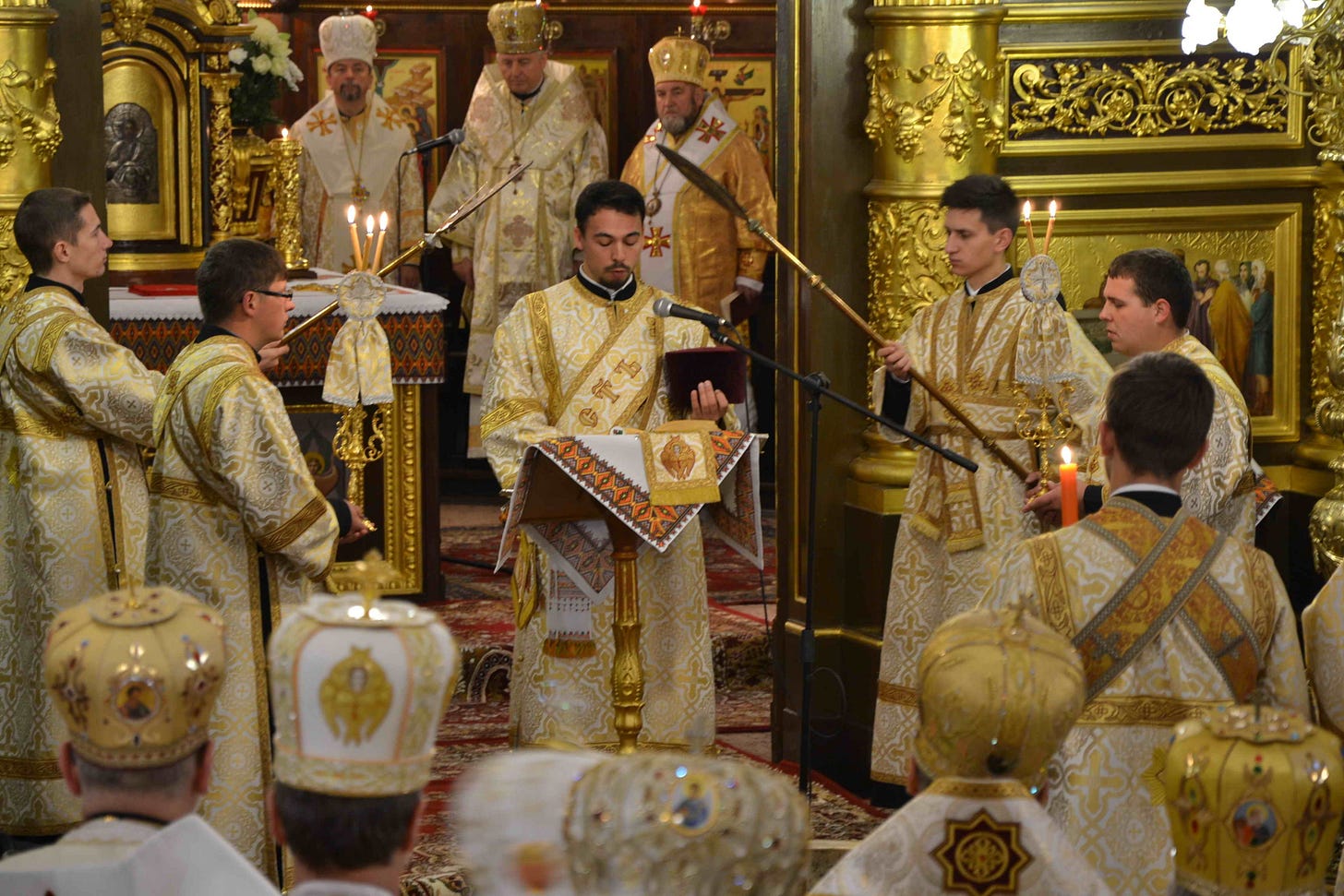
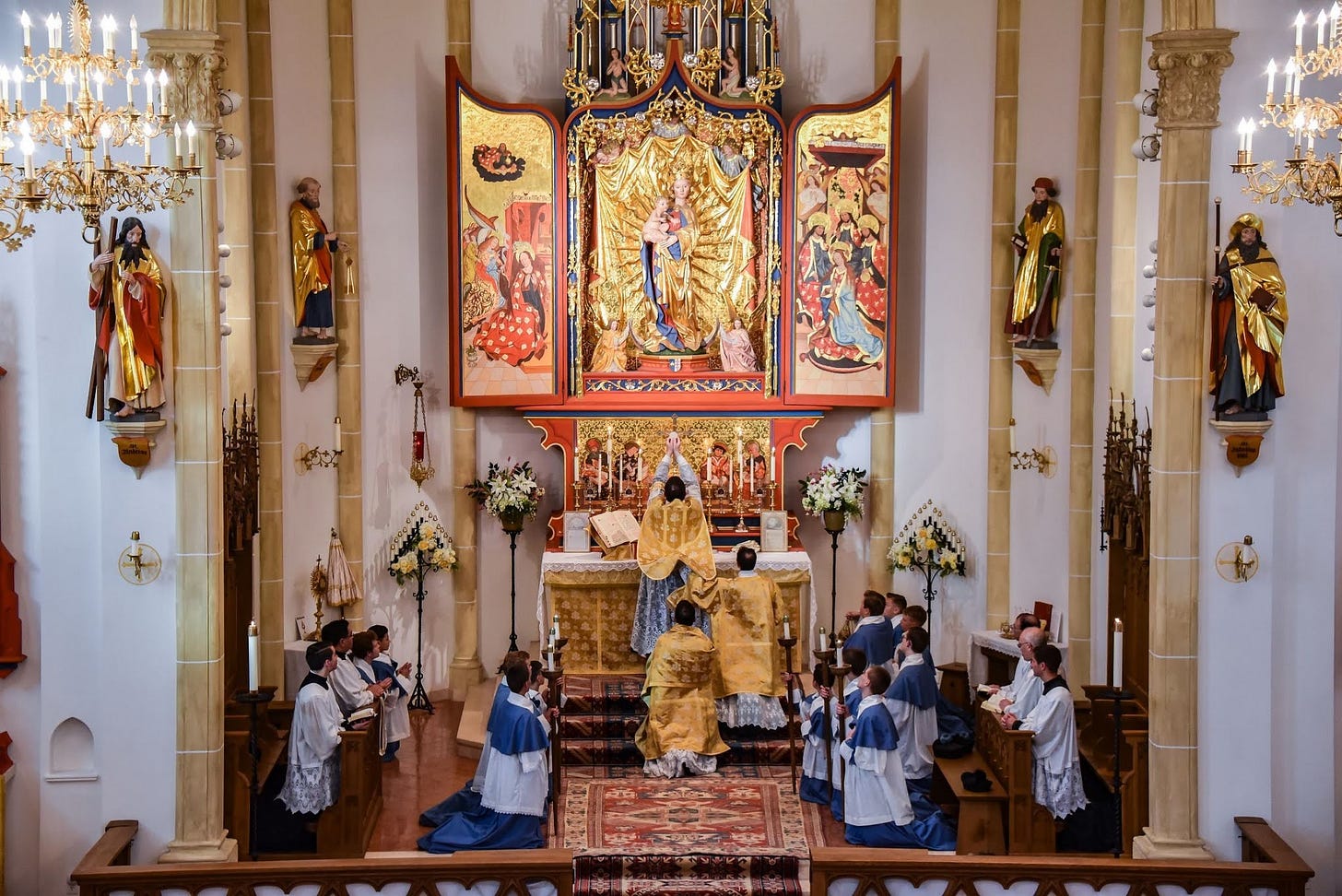
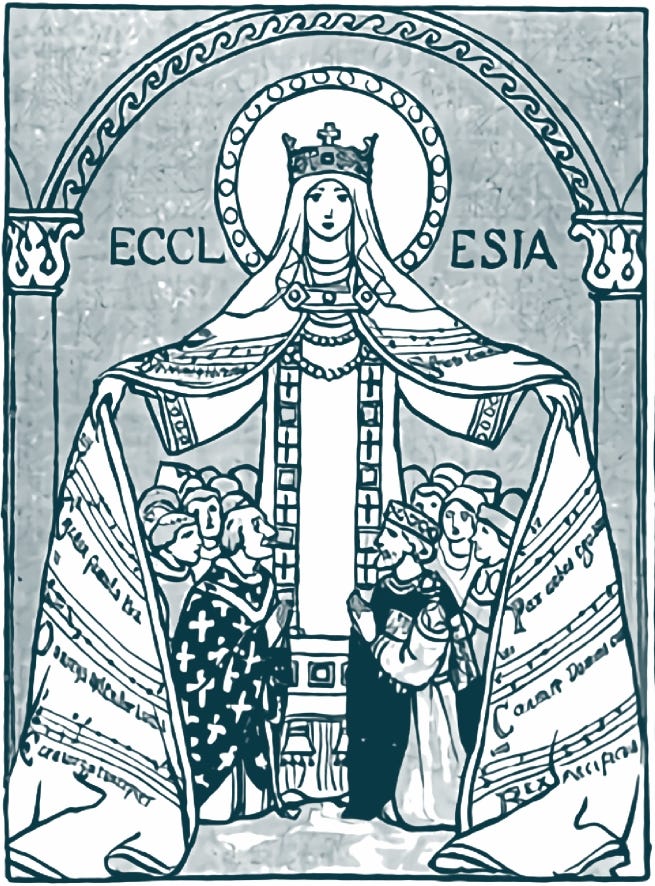
Also, the Eastern Orthodox, although against abortion, accept two divorces and contraception.
Amen! The Catholic Church is the one and only true Church of Jesus Christ, outside of which there is no salvation. As this is traditional Catholic dogma, it boggles the mind how anyone who considers himself a "traditionalist" could ever contemplate leaving. "Lord, to whom shall we go..." (John 6:68)